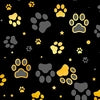How Dogs Have Been Loved by Different World Cultures
Once upon a time, a pack of wolves entered a camp belonging to prehistoric humans in search of food. Wolves and humans looked at each other, and in that moment, a unique bond was created. That bond has only strengthened over the millennia as cultures around the world welcomed canines to sit by their campfire and become fast friends.
Today, dogs play many roles in our lives. More than pets, they are our companions, our guardians, our comfort and our happiness. They are our family.
How did that come to be? The journey that brought our furry friends into our home is so incredible to think about that we simply had to find out more! We looked into how different cultures have loved and celebrated dogs in the past, and decided to share our discoveries below.
Ancient India

Source: Encycloworld Heritage Postcard
The Bhimbetka rock shelters in central India feature some of the oldest cave paintings in the world. Included in the depictions of what human life was like 10,000 years ago are 41 drawings of dogs. One even shows a man with a dog on a leash, as seen above!
As long as dogs have been associated with Indian culture, they have been revered as friends of the Hindu gods and mythological characters. In the epic poem, the Mahabharata, the character Yudhishthira ascends to heaven, only to discover he can’t bring his dog with him. Unwilling to abandon his loyal friend, he returns to earth. A good decision, we think.
The Chippiparia, Indian Pariah, Rajapalayam and Himalayan Sheepdog are some of India’s most beloved native dogs.
Ancient Greece

Source: Wikimedia Commons
The relationship between ancient Greeks and their dogs is often misunderstood. While many breeds were raised for hunting and war, dogs of all kinds were considered a symbol of love and fidelity. Archeologists have even found dog paw prints in terracotta, suggesting some Greeks made an effort to preserve their pup’s imprints in the same way modern parents may get castings of their baby’s hands and feet!
Few stories highlight the bond between dogs and their humans than that of the Greek hero Odysseus. After spending two decades away from home, Odysseus finally returned to Greece... only to find nobody recognised him. Nobody except his dog Argos, that is. Their reuniting was bittersweet, but their love was pure and enduring.
The most popular breed to come from Ancient Greece are the Molossus. Known as strong guardian dogs, the Molossus of Epirus are the only type still around today.
Ancient Egypt

Don’t let the Sphinx fool you into thinking cats ruled in Ancient Egypt. While felines demanded as much respect back then as they do now (hey, even we offer cat collars now), dogs definitely had it good too. In honour of the god Anubis, who is depicted as having the head of a wolf, the temple at Hardai allowed dogs to roam free. Locals would often come to feed and care for the dogs, treating them much like town pets.
Few cultures respect and mourn dogs in death as the Ancient Egyptians did. The passing of a family dog was felt as hard as the loss of a human, and pups were commonly given burials. Rich families were even known to entomb them! Either way, the sadness was always accompanied by the knowledge that the dog would be waiting for their humans in the afterlife, their devotion eternal.
The noble Saluki, proud Pharaoh Hound and barkless Basenji are perhaps the three most prominent breeds deriving from Ancient Egypt.
Japan

Source: pxfuel
Misconceptions abound about the relationship between dogs and Asian cultures. Yes, it’s true that dogs were seen more as status symbols or security systems than as pets, however they have always received huge respect from the Japanese people. In fact, in the late 1600s, shogun Tokugawa Tsuneyoshi passed rules that gave dogs more rights than humans! He came to be known as the ‘Inu Shogun’, which translates roughly to ‘commander of dogs’. I wouldn’t mind being an Inu Shogun.
Pride is a cornerstone of Japan, and that extends to dog breeds associated with the country. Beloved breeds such as the Shiba Inu (you’ll recognise them from the doge meme) and Kishu Ken (white dogs have special significance in Japanese folklore) are strong, proud pups that love being part of a strong leader’s pack.
Other celebrated breeds include Akita, the Japanese Chin (chin meaning royalty) and Tosa Inu.
Europe in the Middle Ages

Source: Wikimedia Commons
In more modern times, dog breeds have come to be celebrated for their unique traits (which we love to use as a guide for people who want to know what colour best suits their dog’s breed). As the aristocracy began designing coats of arms to represent their families, they quickly came to use dogs as symbols of their core values.
A greyhound may represent protection for an English family, while a spaniel could represent devotion in Spain. There were so many variants, with everything from the stance of the dog to the angle of its tale weaving an intricate story. In fact, it was so complex that many chose to feature a white hound called a Talbot that represented all the best traits in a dog. The Talbot is now extinct, and historians question whether it existed before appearing on coats of arms, or whether it was bred as a result of how popular their image had become!
---
It’s clear that no matter the age, and no matter the time, dogs have been loved and respected by cultures across the world. Much has changed in the thousands of years since a wolf asked a human to share their dinner, but it’s clear that is one thing that has remained consistent. We’re not surprised.













































Thanks for sharing this awesome blog. Dogs have been so loved throughout the ages – this is still so true today!
Leave a comment